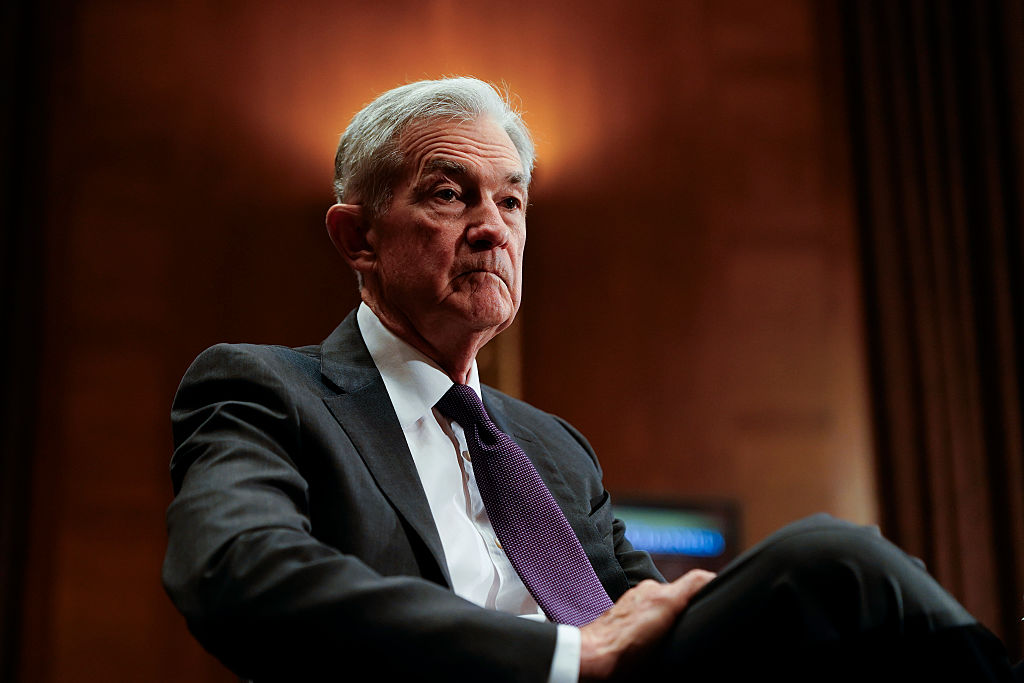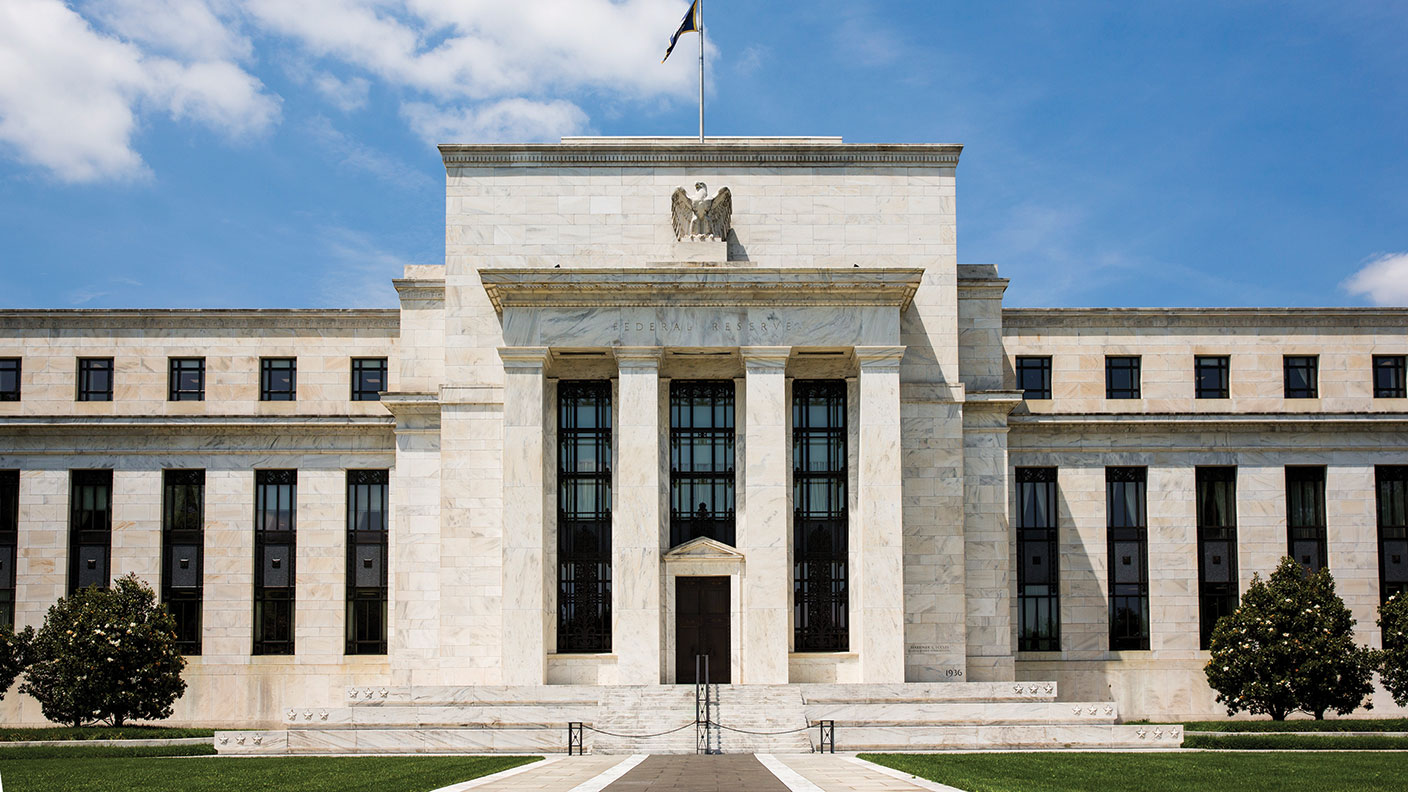
Get the latest financial news, insights and expert analysis from our award-winning MoneyWeek team, to help you understand what really matters when it comes to your finances.
You are now subscribed
Your newsletter sign-up was successful
Want to add more newsletters?

Twice daily
MoneyWeek
Get the latest financial news, insights and expert analysis from our award-winning MoneyWeek team, to help you understand what really matters when it comes to your finances.

Four times a week
Look After My Bills
Sign up to our free money-saving newsletter, filled with the latest news and expert advice to help you find the best tips and deals for managing your bills. Start saving today!
The front cover of The Economist on 23 April showed a picture of Benjamin Franklin with his hand covering half his face in horror.
The headline: “The Fed that failed.”
So it seems.
MoneyWeek
Subscribe to MoneyWeek today and get your first six magazine issues absolutely FREE

Sign up to Money Morning
Don't miss the latest investment and personal finances news, market analysis, plus money-saving tips with our free twice-daily newsletter
Don't miss the latest investment and personal finances news, market analysis, plus money-saving tips with our free twice-daily newsletter
The Federal Reserve’s preferred measure of US inflation has surged to 6.6%. Meanwhile, the recent consumer price inflation reading fell to 8.3% from 8.5%, but that was higher than expected and also shows signs of growing “stickiness”.
The comparable UK number is 7%, but expected to go higher, while for the eurozone it is 7.5%.
Yet long-term followers of Economist covers know that it has a reputation as one of the world’s most reliable contrary indicators.
Is it time to wonder if the inflation panic, far from becoming embedded, is peaking and will soon fade rapidly?
Inflation really is a monetary phenomenon
“Inflation is like toothpaste. Once it is out of the tube, you can hardly get it back in again.” So said Karl Otto Pohl, head of the Bundesbank, in the early 1980s.
Yet for the last 30 years, the annual rate of UK inflation oscillated around 2%, never rising above 5%.
The monetarists who dominated economic thinking 40 to 50 years ago have been forgotten.
“Inflation is always and everywhere a monetary phenomenon,” said Milton Friedman. Ludwig von Mises explained that “inflation is an increase in the quantity of money without a corresponding increase in the demand for it.” Yet, says Chris Watling of Longview Economics, “in the pandemic, we paid people to stay at home – a classic recipe for inflation.”
Last autumn, monetarist guru Professor Tim Congdon was warning that “a rate of inflation of between 5% and 10% is to be expected in the US until the end of 2022 owing to a monetary overhang from the almost 35% growth in the two years to mid-2021. That surely stretches the notion of transitory.” Monetary growth in 2020 had been the highest since 1943.
There is a widespread view, says Watling, that inflation is a global phenomenon.
Yet Japan is still struggling with continuing deflation while the annual rate of Chinese inflation is 1.5%. While broad money growth in the US accelerated by 24.7% in the two years to mid-2021, by 15.8% in the UK and 9.1% in the eurozone, the acceleration in Japan, China and India was much lower. This is no coincidence.
“Of course,” says Watling, “pandemics and wars always cause inflation,” resulting in supply-side shocks. But the monetary policies of Western central banks caused this to spill over into general inflation.
This is being exacerbated at present by tight labour markets, which are leading to wage rises. In the 1970s, a wage-price spiral followed until tight monetary policies caused a recession.
Inflation may fall faster than expected – and the UK may avoid recession
However now, according to the monetary data, a crunch is underway. Research group Macrostrategy points out that US monetary growth has slowed on a three-month annualised basis to 3%. Just two months earlier, the rate had been 6.2%, and 5.4% in the eurozone, 3.8% in Japan and 2.2% in the UK, according to Congdon.
“Overheating and upward pressures on underlying inflation will persist for a few quarters yet,” he writes, “but then inflation will exceed monetary growth. Asset price weakness is then almost certain as a precursor and associate of recession.”
“The recent moderation in money growth implies that inflation will come down closer to the norms of the 2010s… but the lags are such that both this year and 2023 will feature annual inflation rates typically above 5% and sometimes above 10%.”
Growth in bank credit in the US will require the Fed to go on raising interest rates, but is more muted in Japan and the eurozone, while regulatory pressure in the UK to raise the capital ratios of banks will be deflationary.
Watling is “not convinced by the ‘recession in the UK’ argument due to £200bn of excess savings.” He agrees that “inflation will come down in the medium to long term from where it was” but is optimistic that the supply and demand for energy will come into better balance in 2023 with high prices curtailing demand, stimulating output and causing prices to drop sharply.
If correct, inflation will come down sooner and faster than expected. Real monetary growth might not turn negative, so economic growth in the West would still slow but recession would be avoided.
In either scenario, interest rates have further to rise but should remain below 3%. This might mean that US government bond yields, which recently breached 3% before retreating again, are near a medium-term peak, but Watling warns about long-term complacency. He believes that a 30-40 year downtrend came to an end in 2020 and that the trend will be upward for equally long.
The outlook for equities depends on whether recession will be avoided. But the behaviour of energy prices, with the oil price hovering around $100 a barrel rather than hitting new peaks, suggests that Watling will be proved right and the Economist, once again, will have got it wrong.
SEE ALSO:
Calculate your personal inflation rate
Why new technology will pump up inflation
Get the latest financial news, insights and expert analysis from our award-winning MoneyWeek team, to help you understand what really matters when it comes to your finances.

Max has an Economics degree from the University of Cambridge and is a chartered accountant. He worked at Investec Asset Management for 12 years, managing multi-asset funds investing in internally and externally managed funds, including investment trusts. This included a fund of investment trusts which grew to £120m+. Max has managed ten investment trusts (winning many awards) and sat on the boards of three trusts – two directorships are still active.
After 39 years in financial services, including 30 as a professional fund manager, Max took semi-retirement in 2017. Max has been a MoneyWeek columnist since 2016 writing about investment funds and more generally on markets online, plus occasional opinion pieces. He also writes for the Investment Trust Handbook each year and has contributed to The Daily Telegraph and other publications. See here for details of current investments held by Max.
-
 Should you buy an active ETF?
Should you buy an active ETF?ETFs are often mischaracterised as passive products, but they can be a convenient way to add active management to your portfolio
-
 Power up your pension before 5 April – easy ways to save before the tax year end
Power up your pension before 5 April – easy ways to save before the tax year endWith the end of the tax year looming, pension savers currently have a window to review and maximise what’s going into their retirement funds – we look at how
-
 How a dovish Federal Reserve could affect you
How a dovish Federal Reserve could affect youTrump’s pick for the US Federal Reserve is not so much of a yes-man as his rival, but interest rates will still come down quickly, says Cris Sholto Heaton
-
 New Federal Reserve chair Kevin Warsh has his work cut out
New Federal Reserve chair Kevin Warsh has his work cut outOpinion Kevin Warsh must make it clear that he, not Trump, is in charge at the Fed. If he doesn't, the US dollar and Treasury bills sell-off will start all over again
-
 'Investors should brace for Trump’s great inflation'
'Investors should brace for Trump’s great inflation'Opinion Donald Trump's actions against Federal Reserve chair Jerome Powell will likely stoke rising prices. Investors should prepare for the worst, says Matthew Lynn
-
 'Governments are launching an assault on the independence of central banks'
'Governments are launching an assault on the independence of central banks'Opinion Say goodbye to the era of central bank orthodoxy and hello to the new era of central bank dependency, says Jeremy McKeown
-
 Will Donald Trump sack Jerome Powell, the Federal Reserve chief?
Will Donald Trump sack Jerome Powell, the Federal Reserve chief?It seems clear that Trump would like to sack Jerome Powell if he could only find a constitutional cause. Why, and what would it mean for financial markets?
-
 Do we need central banks, or is it time to privatise money?
Do we need central banks, or is it time to privatise money?Analysis Free banking is one alternative to central banks, but would switching to a radical new system be worth the risk?
-
 Will turmoil in the Middle East trigger inflation?
Will turmoil in the Middle East trigger inflation?The risk of an escalating Middle East crisis continues to rise. Markets appear to be dismissing the prospect. Here's how investors can protect themselves.
-
 Federal Reserve cuts US interest rates for the first time in more than four years
Federal Reserve cuts US interest rates for the first time in more than four yearsPolicymakers at the US central bank also suggested rates would be cut further before the year is out
